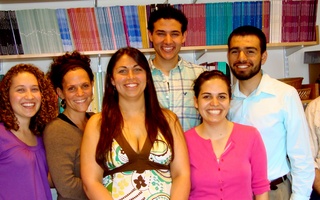{shortcode-05f14e6bdbaeac05fb7d3fc171bce66f19ddb8df}
With chants and testimonies, around 30 students gathered outside of the Law School’s Caspersen Student Center Tuesday evening to “stand in solidarity” with the Nationwide Prison Strike, a national protest calling for prison reform.
The event was organized by the Powerfully Utilizing Law School Educations for Political and Social Justice Committee, a subcommittee of the Harvard Black Law Students Association. It aimed to support the Nationwide Prison Strike, which started on Aug. 21 and is slated to end on Sept. 9. The strike comes in response to a riot at Lee Correctional Institution, a maximum security prison in South Carolina, in April. The riot resulted in the deaths of seven inmates.
The attendees formed a semicircle around a memorial that honors slaves owned by the family of Isaac Royall Jr., the original benefactor of Harvard’s law program.
Students at the event Tuesday circulated a document demanding a number of reforms to federal, immigration, and state prisons. These include monetary compensation for labor performed by prisoners, a possibility of parole for all prisoners, and “an immediate end to the racial overcharging, over-sentencing, and parole denials of Black and brown humans.”
The types of prisoner strikes taking place across the country include work strikes, peaceful sit-ins, spending boycotts, and hunger strikes, according to a press release from the Incarcerated Workers Organizing Committee.
At the Harvard event, attendees first introduced themselves and stated why they decided to “stand in solidarity” with the national strike. The group was made up of a mix of first-year, second-year, and third-year students at the Law School as well as at least one Harvard Kennedy School student.
Organizers then opened up the space to those who wished to speak further about the issue, and wrapped up the event with a collective chant from Assata Shakur, a former member of the Black Liberation Army who wrote an autobiography after receiving political asylum in Cuba following her imprisonment for a murder conviction.
The chant reads: “It is our duty to fight for our freedom. It is our duty to win. We must love each other and support each other. We have nothing to lose but our chains.”
The group read the chant three times with increasing volume.
Lauren Williams, president of BLSA, attended the event and shared a story of how her grandmother was a sharecropper and how it connects to the ongoing prison strike.
“She was a sharecropper and picked cotton and to see images and see that imagery and to understand the parallels that are existing today when we were told that we got rid of that, we were done, and to still see that connection—to me, there are really strong parallels,” Williams said. “It almost feels like a new iteration of slavery in some ways.”
Emanuel Powell, one of the chairs of the PULSE committee, said he helped organize the event to help bring attention to the issue to those at Harvard.
“As the chair of our PULSE committee, that was kind of my role to support us and taking that idea and turning that it into an actual event and starting hopefully a longer process of helping the university become better in terms of how it’s thinking about those who are incarcerated and how we are getting educated on the issues they face,” Powell said.
—Staff writer Aidan F. Ryan can be reached at aidan.ryan@thecrimson.com. Follow him on Twitter @AidanRyanNH.
Read more in News
With Sunflowers and Snacks, Smith Center Opens Its DoorsRecommended Articles
-
Atilla and MeThe three strikes proposal needs to be reconsidered. Governor William F. Weld '66 has always had sharp political instincts, but
-
Experts in Psychology, Law Discuss Juvenile SentencingExperts in forensic psychology, law, and juvenile justice policy discussed the Supreme Court’s decision to retroactively apply a recent ruling to ban mandatory life without possibility of parole for some 2,000 incarcerated juvenile homicides at the Harvard Law School Wednesday.
-
The Rejection of Michelle Jones is Harvard’s LossBy turning away Jones, what message is Harvard sending to my students about the possibilities for their own futures?
-
Beyond Bars, Beyond GatesIf Harvard is serious about education as a civil right, it is time to start offering College courses in Massachusetts prisons.
-
 A Look Back at Harvard's Prison Studies Project
A Look Back at Harvard's Prison Studies Project













